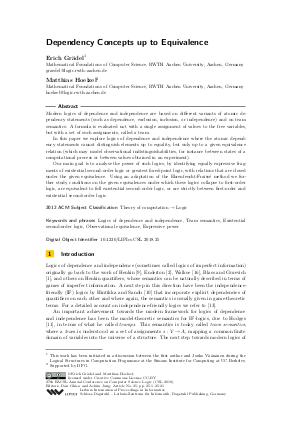Dependency Concepts up to Equivalence
Authors Erich Grädel, Matthias Hoelzel
-
Part of:
Volume:
27th EACSL Annual Conference on Computer Science Logic (CSL 2018)
Part of: Series: Leibniz International Proceedings in Informatics (LIPIcs)
Part of: Conference: Computer Science Logic (CSL) - License:
 Creative Commons Attribution 3.0 Unported license
Creative Commons Attribution 3.0 Unported license
- Publication Date: 2018-08-29
File

PDF
LIPIcs.CSL.2018.25.pdf
- Filesize: 0.55 MB
- 21 pages
Document Identifiers
Subject Classification
ACM Subject Classification
- Theory of computation → Logic
Keywords
- Logics of dependence and independence
- Team semantics
- Existential second-order logic
- Observational equivalence
- Expressive power
Metrics
- Access Statistics
-
Total Accesses (updated on a weekly basis)
0PDF Downloads0Metadata Views
Abstract
Modern logics of dependence and independence are based on different variants of atomic dependency statements (such as dependence, exclusion, inclusion, or independence) and on team semantics: A formula is evaluated not with a single assignment of values to the free variables, but with a set of such assignments, called a team. In this paper we explore logics of dependence and independence where the atomic dependency statements cannot distinguish elements up to equality, but only up to a given equivalence relation (which may model observational indistinguishabilities, for instance between states of a computational process or between values obtained in an experiment). Our main goal is to analyse the power of such logics, by identifying equally expressive fragments of existential second-order logic or greatest fixed-point logic, with relations that are closed under the given equivalence. Using an adaptation of the Ehrenfeucht-Fraïssé method we further study conditions on the given equivalences under which these logics collapse to first-order logic, are equivalent to full existential second-order logic, or are strictly between first-order and existential second-order logic.
Cite As Get BibTex
Erich Grädel and Matthias Hoelzel. Dependency Concepts up to Equivalence. In 27th EACSL Annual Conference on Computer Science Logic (CSL 2018). Leibniz International Proceedings in Informatics (LIPIcs), Volume 119, pp. 25:1-25:21, Schloss Dagstuhl – Leibniz-Zentrum für Informatik (2018)
https://doi.org/10.4230/LIPIcs.CSL.2018.25
BibTex
@InProceedings{gradel_et_al:LIPIcs.CSL.2018.25,
author = {Gr\"{a}del, Erich and Hoelzel, Matthias},
title = {{Dependency Concepts up to Equivalence}},
booktitle = {27th EACSL Annual Conference on Computer Science Logic (CSL 2018)},
pages = {25:1--25:21},
series = {Leibniz International Proceedings in Informatics (LIPIcs)},
ISBN = {978-3-95977-088-0},
ISSN = {1868-8969},
year = {2018},
volume = {119},
editor = {Ghica, Dan R. and Jung, Achim},
publisher = {Schloss Dagstuhl -- Leibniz-Zentrum f{\"u}r Informatik},
address = {Dagstuhl, Germany},
URL = {https://drops.dagstuhl.de/entities/document/10.4230/LIPIcs.CSL.2018.25},
URN = {urn:nbn:de:0030-drops-96921},
doi = {10.4230/LIPIcs.CSL.2018.25},
annote = {Keywords: Logics of dependence and independence, Team semantics, Existential second-order logic, Observational equivalence, Expressive power}
}
Author Details
Funding
- Grädel, Erich: This work has been initiated in a discussion between the first author and Jouko Väänänen during the Logical Structures in Computation Programme at the Simons Institute for Computing at UC Berkeley.
- Hoelzel, Matthias: Supported by DFG.
References
-
A. Blass and Y. Gurevich. Henkin quantifiers and complete problems. Annals of Pure and Applied Logic, 32:1-16, 1986.

-
H. Enderton. Finite partially ordered quantifiers. Z. Math. Logik, 16:393-397, 1970.

-
F. Engström. Generalized quantifiers in dependence logic. Journal of Logic, Language, and Information, 2012.

-
S. Abramsky et al., editor. Dependence Logic. Theory and Applications. Birkhäuser, 2016.

-
P. Galliani. Inclusion and exclusion in team semantics - on some logics of imperfect information. Annals of Pure and Applied Logic, 163:68-84, 2012.

-
P. Galliani and L. Hella. Inclusion Logic and Fixed Point Logic. In Computer Science Logic 2013, pages 281-295, 2013.

-
E. Grädel. Games for inclusion logic and fixed-point logic. In S. Abramsky et al., editor, Dependence Logic. Theory and Applications. Birkhäuser, 2016.

-
E. Grädel and J. Väänänen. Dependence and independence. Studia Logica, 101(2):399-410, 2013.

-
L. Henkin. Some remarks on infinitely long formulas. Journal of Symbolic Logic, pages 167-183, 1961.

-
J. Hintikka and G. Sandu. Informational independence as a semantical phenomenon. In Studies in Logic and Foundations of Mathematics, volume 126, pages 571-589. North-Holland, 1989.

-
W. Hodges. Compositional semantics for a logic of imperfect information. Logic Journal of IGPL, 5:539-563, 1997.

-
J. Kontinen and J. Väänänen. On definability in dependence logic. Journal of Logic, Language, and Information, 18:317-241, 2009.

-
A. Mann, G. Sandu, and M. Sevenster. Independence-Friendly Logic. A Game-Theoretic Approach, volume 386 of London Mathematical Society Lecture Notes Series. Cambridge University Press, 2012.

-
R. Rönnholm. Capturing k-ary existential second-order logic with k-ary inclusion-exclusion logic. Ann. Pure Appl. Logic, 169(3):177-215, 2018.

-
J. Väänänen. Dependence logic: A new approach to independence friendly logic, volume 70. Cambridge University Press, 2007.

-
W. Walkoe. Finite partially-ordered quantification. Journal of Symbolic Logic, 35:535-555, 1970.

